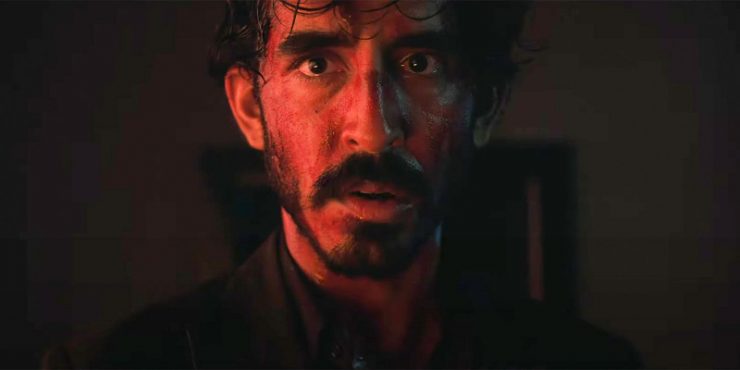The promotional materials for Monkey Man want you to think of John Wick. You can say this about the promotional materials about any action movie nowadays, but with this film we get some direct parallels, including the vicious revenge narrative, the seemingly un-killable protagonist, and all the neon, bisexual lighting. When you actually watch the movie itself, you’ll more likely be reminded of another Dev Patel starring vehicle, Danny Boyle’s Slumdog Millionaire. Boyle’s film is one of the more surprise box office hits of the last 25 years and one of the more curious Best Picture winners. Like Slumdog, Monkey Man – Patel’s directorial debut – tries to thread the needle between the bombast of Bollywood and the self-righteousness of Hollywood action films.
Patel plays Bobby, an orphan whose mother died when he was young, under violent circumstances. As an adult, he carries the trauma of her death and copes by participating in backroom brawls where he routinely gets the snot kicked out of him – and routinely gets mocked by the fight promoter played by Sharlto Copley. Out of the ring, Bobby tries to climb the ranks of a sex trafficking business run by Queenie Kapoor (Ashwini Kalsekar). A frequent patron in Queenie’s establishment is a high-ranking police officer named Rana Singh (Sikandar Kher), a man who triggers memories of Bobby’s traumatic past. Rana works as a heavy for the political holy man, Baba Shakti (Makarand Deshpande), who masks his murderous intentions behind the guise of devout allegiance.
It takes a second for Monkey Man to get going, and you’ll spend some time trying to figure out Bobby’s plan to exact vengeance for the part Singh and Shakti played in his mother’s death. The script (by Patel, Paul Angunawela, and John Collee) struggles with proper pacing, and while there’s plenty of fight scenes to be had, we’re not totally sure why anyone’s fighting at all until about halfway through the movie. Patel gets the story credit, and it’s obvious this is his passion project. He fills his debut with so much style, so many overlapping themes, and so much narrative glut. He’s directing like a man who thinks he’ll never get to direct again. This is why, despite the film’s high octane action, Monkey Man feels laborious for long stretches, waiting too long to give you the inevitable tragic backstory in whole.
The hand-held cinematography and the visceral close-ups is another clue that 2000’s era Boyle (particularly his collaborations with legendary DP Anthony Dod Mantle) is an influence. Patel is aggressive in his set-ups, never missing an opportunity to place his camera within the action. This sometimes undermines the majesty of the fight choreography, making it hard to parse what exactly is happening to whom. This tightness of framing is likely a consequence of budget restraints, but it does highlight the brutality of the violence. In the film’s final thirty minutes, when it finally lays its cards on the table proper, we get the film’s best sequence, where Patel’s Bobby finally puts all his rage and strength to use against the villains we’ve been waiting to see get taken down. The only problem is that we’re nearly ninety minutes into the movie before this happens.
This was filmed as a Netflix movie, but the streamer jumped ship. Monkey Man was feared lost until Peele got around to seeing it and convinced Universal to pick it up under Peele’s Monkeypaw Productions. A blessing in disguise, the film ended up getting the kind of theatrical rollout that Netflix never would have provided. As it stands, in its first weekend alone, Patel’s debut has already made back its budget, and will likely end up as a modest hit for Peele and Universal. For all its faults, Monkey Man does prove Patel to be a star, and while his storytelling skills may be raw, he has a level of empathy that many Hollywood filmmakers lack (for all the script’s clunkiness, a side plot involving a transgender sub-community being persecuted by Baba Shakti is handled with graceful delicacy). If this movie’s success means Patel will get a shot to be a star in a movie by a real director, I’m happy for it.
Directed by Dev Patel










